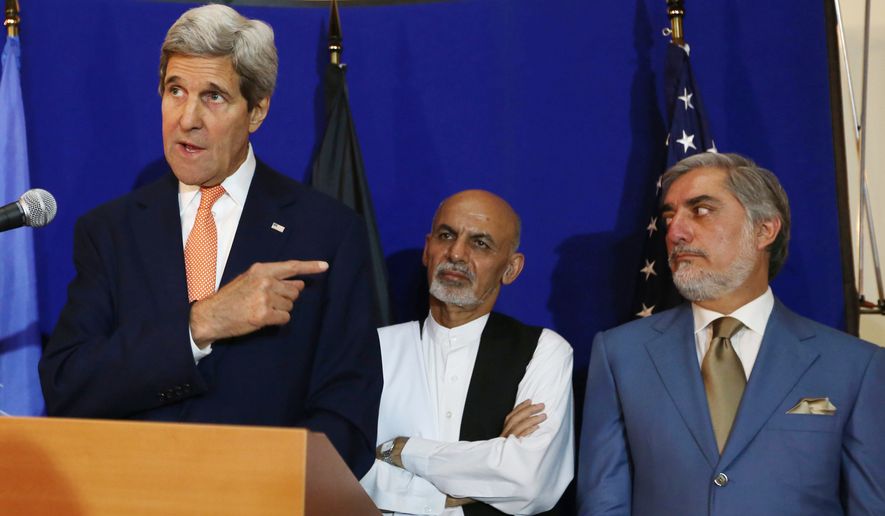OPINION:
Afghanistan is on the verge of an all-out civil war. Fraud has seriously marred the June presidential runoff election. Secretary of State John Kerry traveled to Kabul to mediate between the two opposing candidates. Both Dr. Ashraf Ghani, a former finance minister and winner of the runoff, and Dr. Abdullah Abdullah, a former foreign minister and the runoff’s losing candidate, agreed to a recount of all ballots and to abide by the result. However, the candidates and their representatives could not agree on what consisted of a counterfeit and what could be accepted as a valid ballot.
The breakdown forced Secretary Kerry to make another trip to Kabul. This time, he persuaded the candidates to sign a paper in which they once again promised to abide by the result of the recount, the modalities of which would be based on a U.N. proposed formula. Additionally, the candidates promised that the winner would appoint the loser to an “executive” position in continuance of a cooperative spirit.
As always, the devil is in the details. Now, a schism has developed between the two sides over what the “executive” position would mean in practice. Supporters of Dr. Abdullah believe the “executive” position must have, if not the same, close to the powers a prime minister has in parliamentary systems. Dr. Ghani explained his understanding of the “executive” position in a markedly different way. He said the position would be at the pleasure of the President—the one who wins the recount—and would carry no executive privileges.
And when outgoing President Hamid Karzai increased the pressure on the two candidates by declaring he would leave office on September 2 and by then the next president should be known and ready to take over the presidency, Dr. Abdullah declared the recount illegitimate and withdrew his representatives from it. Dr. Abdullah’s boycott led Dr. Ghani to order his representatives also to quit the process.
Notwithstanding the smiles and hugs when the agreements were announced during Secretary Kerry’s two visits to Kabul, the process is on the verge of collapse. The recount presently continues under United Nations’ supervision but without the two candidates’ representatives. It is not clear whether the two candidates will accept its result. Should they disagree with whatever may come out of the process, the effort to determine who would be Afghanistan’s next president would fail. In that case, Afghanistan would most probably descend into a civil war.
To avoid such a calamity, the U.S. must abandon its feeble, reactive attitude and adopt an assertive, proactive policy. It must have a plan ready to be implemented should the present deadlock between the two candidates erupt into open hostility.
One way to prepare for that eventuality is to form an interim government to be put immediately in place if violence broke out or the two candidates proved unable to resolve their dispute.
The members of the interim government must be apolitical technocrats with good educational backgrounds, adequate work experience, and managerial abilities. The choices must fall upon people who consider a government position an opportunity to serve, not a chance to get rich.
The interim government must be tasked with ending the present system of parceling out government jobs to warlords and members of their families. It must trim the bloated government and strengthen its institutions. In fact, the democratization procedure must be repeated all over again. Over the past twelve years, President Karzai and some of his supporters have misused the executive and judiciary to commit massive irregularities and corruption. These illegalities and injustices, committed in the name of democracy, have led the average Afghan to believe that democracy is a Western system to control and exploit the people.
The other important task of the interim government would be to implement urgently needed economic activities. Agriculture, where eighty percent of Afghans toil, must be revitalized. The private sector must be encouraged to build production facilities to create well-paying and secure jobs. Natural resources should not be parceled out to relatives and friends of the political elite. These assets should be bid out to companies and entrepreneurs who would be willing to invest and do the job professionally and with concern for the surrounding population and the environment.
Nothing of the above can be realized without the right laws and the willingness to enforce them. Therefore, the most important task for the interim government would be to rewrite Afghanistan’s flawed constitution and to draft new civil and penal codes. The body of the new laws must be firmly anchored in modern legal concepts and reflect the social norms of the 21st Century.
All this could and should be done in two to three years. Should the investiture of an interim government become necessary, it could become the vehicle to bring peace and stability to Afghanistan and prepare that country for truly free and fair elections.
Nasir Shansab was once Afghanistan’s leading industrialist before he was forced to leave the country in 1975. He has periodically returned to that country in the years since the U.S. invasion and is the author of the novel “Silent Trees.”




Please read our comment policy before commenting.